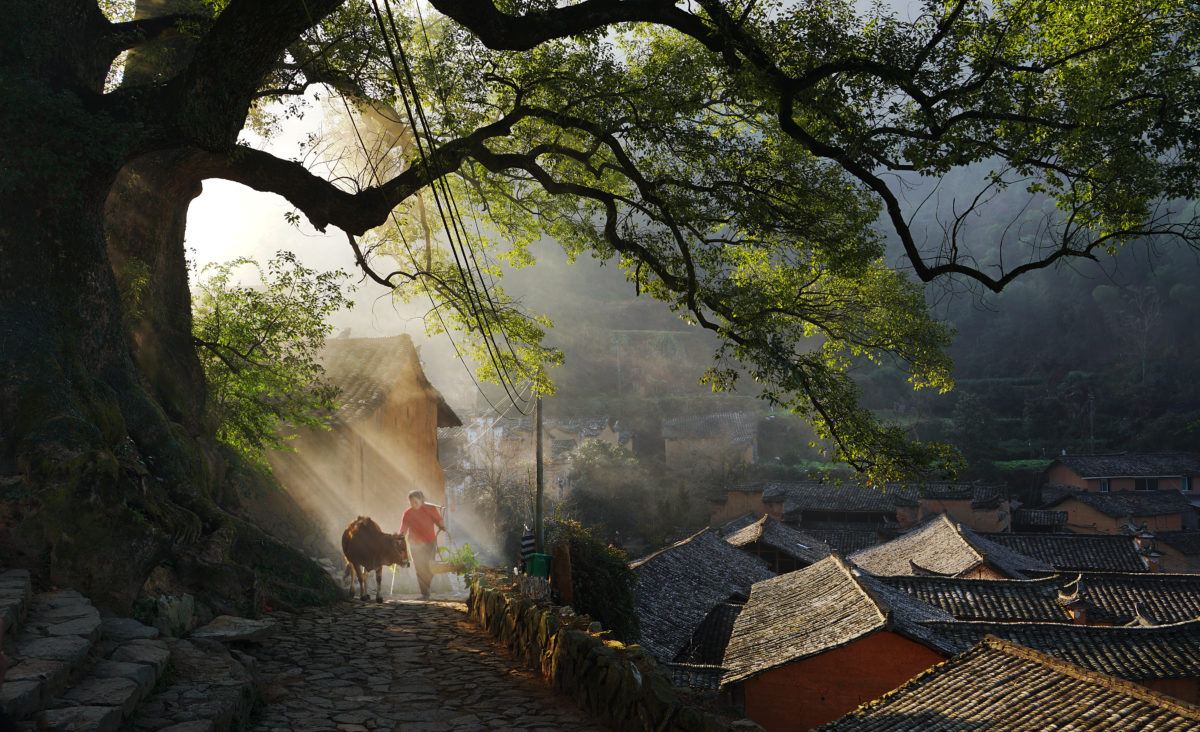
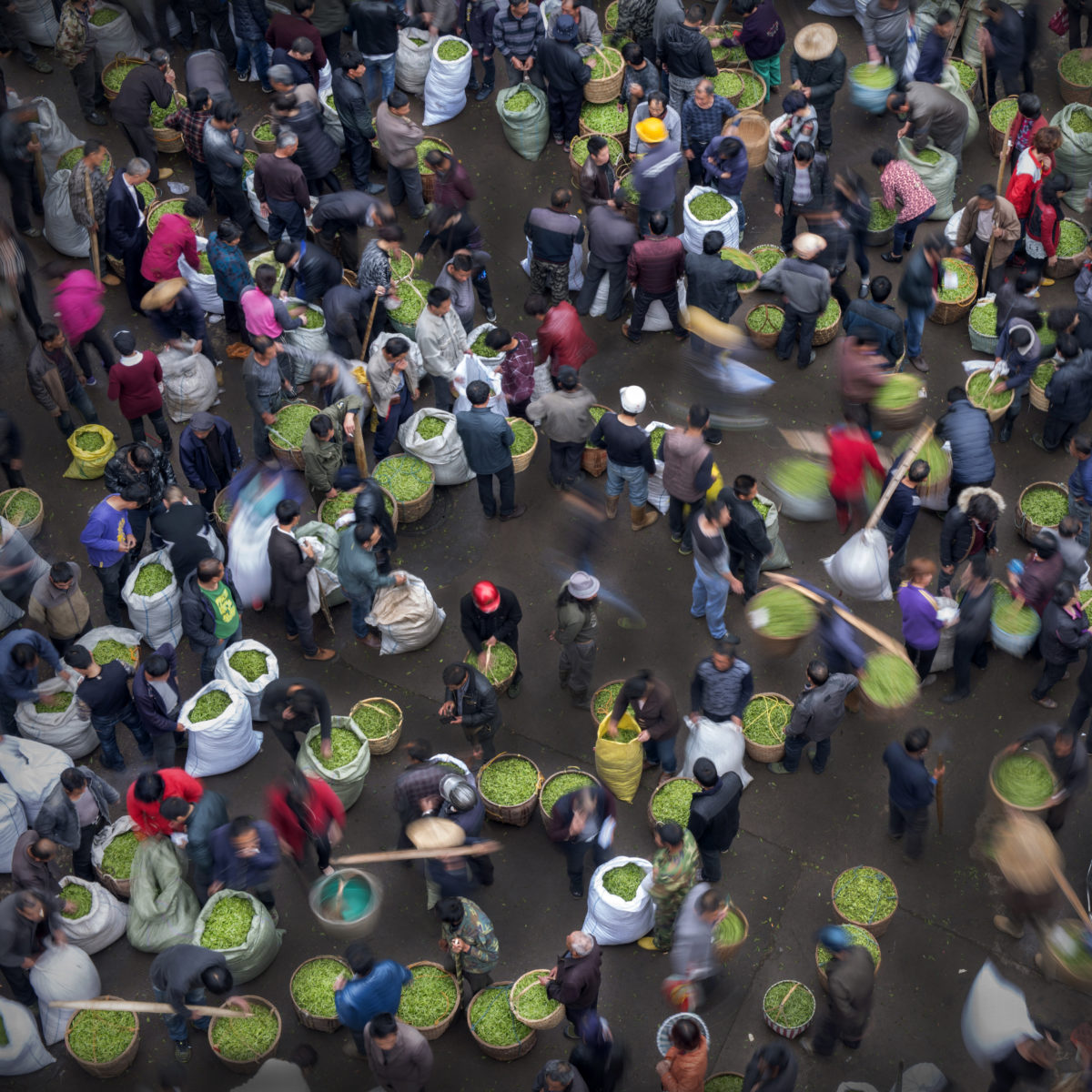
Songyang’s Zhenan Tea Market opens at 5 a.m. Sellers crowd the open market from dawn to dusk, trading as much as 60 metric tons of green tea a day in a country that cherishes green tea, generating $750 million annually in sales.
The village of Songyang first achieved prominence during the Eastern Han Dynasty (AD 199). It is nestled in mountainous Southwest Zhejiang Province, upstream of the picturesque Ou River. Songyang is known throughout China for its historical and cultural importance. It is a region in transition where ancient architectural treasures are in harmony with newer construction like the Da Mu Shan Tea House, designed by architect Xu Tiantian, a graduate of the Harvard School of Design.
The town’s old temple now houses an art gallery with a café and bookstore, community space, and a boutique hotel.
The scenic county spans an area of 1,406 square kilometers and includes three sub-districts and 16 townships. The county is home to 240,600 people, mainly Han. Many are clustered in small villages high in the mountains that comprise 80% of the terrain. Forty percent are engaged in producing tea which accounts for 60% of the agricultural output. Songyang itself is pastoral. It is here that clean water and green mountains first nurtured the tea cultivars that produce high-quality Songyang Yinhou (Yin Hao) tea, a legendary tea in Chinese culture.
Glorious Green Tea
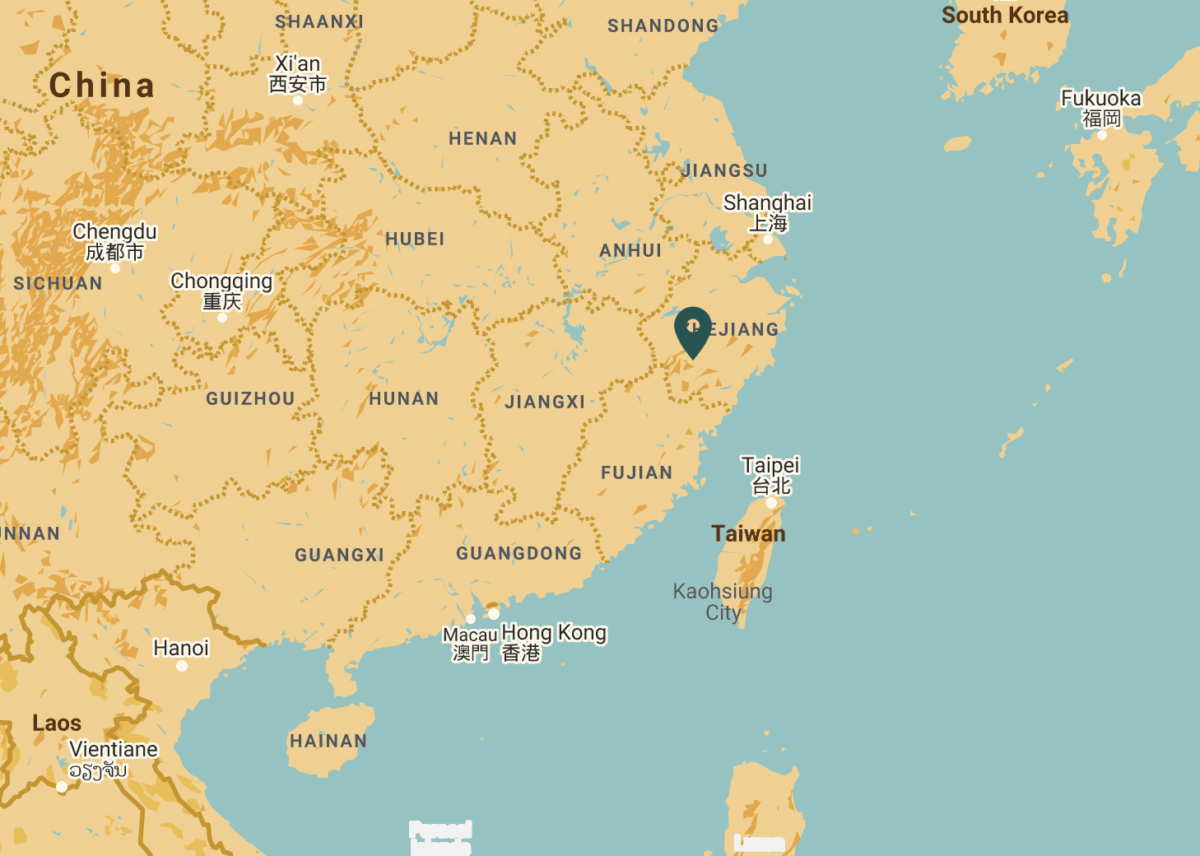
Growers have planted tea here for thousands of years. The terraced hillsides are typical of traditional tea-producing regions, but Songyang is also a model county for national tea industry development. Plantations cover 20,403 acres. The local tea industry, from crop to cup, is valued at $1.40 billion [RMB9.39 billion].
The Zhenan Tea Market, with a trading volume of 76,600 metric tons, is the largest origin market for green tea in the country. The national benchmark for green tea price indexes is set at Zhenan. Yinhou is the predominate green tea on offer but Songyang also produces Xiang Tea, a well respected green tea.
The region is also known for its Duanwu Tea, a popular herbal drink invented by Ye Fashan (631-720), a Taoist wonder-worker who lived during the Tang Dynasty. The tisane is brewed from a selection of fresh herbs picked during the Dragon Boat Festival celebrated annually on the fifth day of the fifth month of the Chinese Calendar (June 25, 2020).
The region has evolved into a major tourist destination. The Damushan tea plantation is the nation’s first tea-themed 4A level scenic spot with sightseeing, sporting events, entertainment, and other functions. In Songyang, you can not only enjoy the symmetry of a well-groomed ecological tea plantation, the fragrance of green tea, but also cycle through the country side, take long walks, and enjoy many entertaining activities.
Modern Songyang integrates the essence of mountain and river, the taste of the countryside, and the beauty of folk art and local customs.
Architectural Treasure
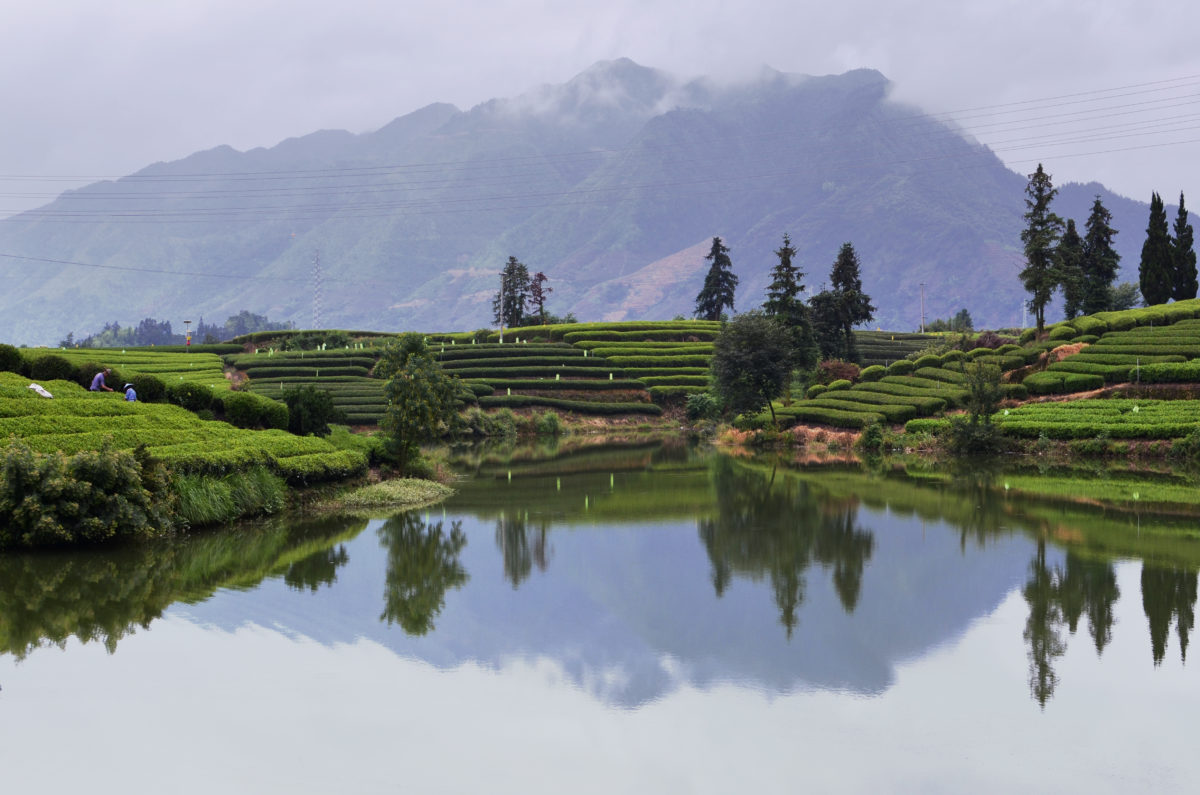
Songyang village is a well-preserved example of classic Chinese architecture. A wealthy village, Songyang was once the economic, political, and cultural center of Chuzhou, (known today as Lishui City) which was founded more than 1,800 years ago. More than 40 well-preserved buildings from the Qing Dynasty are designated as protected historical and cultural sites including the Yanqing Temple Pagoda and Huang Courtyard. There are still many old shops on the ancient streets where families engage in traditional handcraft, including iron forging, weigh-beam, and a Chinese herbal medicine shop.
There are many prominent mountain peaks in Songyang the tallest of which is Ruoliaoxian at 4,928 ft. [1,502 m]. More than 100 mountain villages have been preserved, including 71 Chinese traditional villages. Songyang ranks No.1 in Eastern China and No.2 nationwide as a cultural heritage site. Songyang has been called the Last Jiangnan Fairyland by Chinese National Geographic. Culture is alive with sound thanks to the Songyang Gaoqiang Opera, a Chinese aria opera founded during the Ming Dynasty (1368-1644) and listed among the finest of national intangible cultural heritages.
When you go
Songyang is a three-hour train ride from Hangzhou, the provincial capital of Zhejiang. Visitors can either fly to Wenzhou and then travel two hours by car to Songyang or take the train from Quzhou to Songyang (a one hour ride). Well-known hotels include the Tianyuan Mingdu hotel and the Song Tai hotel downtown.
Official website (Chinese): Songyang County
Wikipedia: Songyang County
Tour information: Songyang Scenic Tour
Scenic Views
Songyang Garden absolutely tops the list of scenic views. Surrounded by bamboo and broad-leaf forested peaks, the Songgu Plain covers thousands of acres. Deep valleys display splendid landscapes with tea gardens and cropland perched along the banks of the Songyin River. Songyang Garden is known as Peach Blossom Land, a description dating to ancient times. Wang Wei, a famous poet in the Tang Dynasty, suggested travelers “Go to Songyang in the right season and you will hear the river flowing and singing.” In a poem inspired by its beauty, Shen Hui, the most famous scholar in the Song Dynasty, wrote that “Nothing nearby can compare to this Peach Blossom Land.”
Songyang is an ecology-friendly place for entertaining and exercise. The county is a national eco-demonstration area with forest coverage of 78.2% and air quality, scoring 95.5% with a 100% rating for water.
Visitors will find Songyang is a tranquil place with lively wild birds, babbling limpid springs, and beautiful countryside. Here, modern urbanites can slow down the pace and relax. Songyang has been a perfect place for entertaining and regimen with its own culture and customs. In Songyang, you can refresh yourself and release the accumulated stress from work. After a close connection with nature, you will experience renewed power and energy.
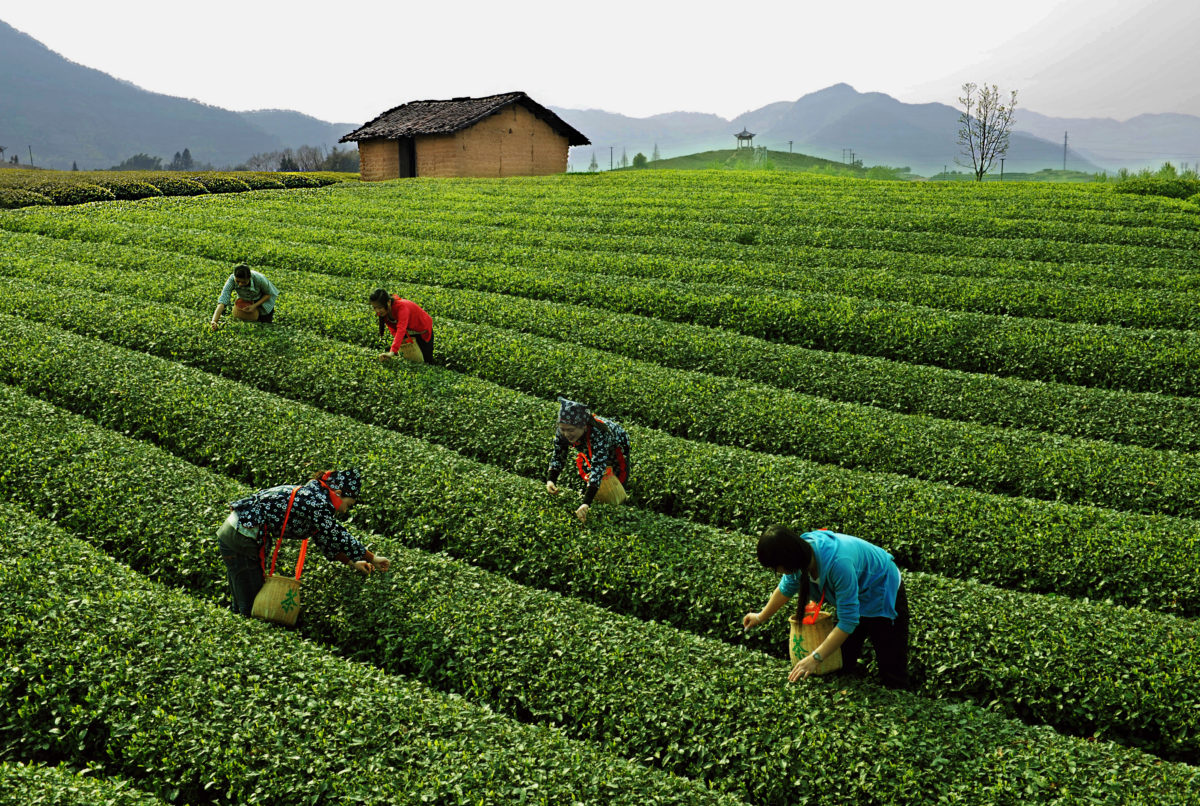
Tea Market
Get More Value from Your Tea: BRU Maker One
+41794574278
Jacque's Organics
(647) 804-7263